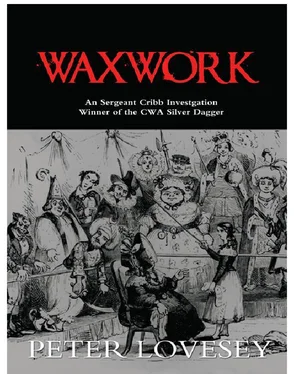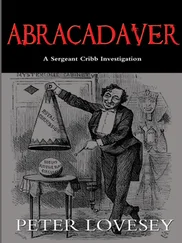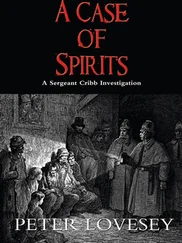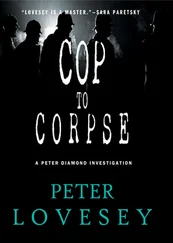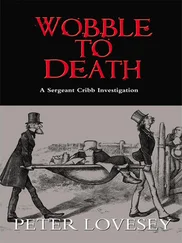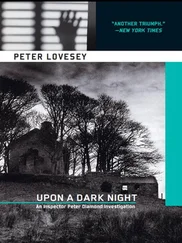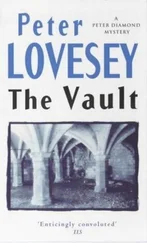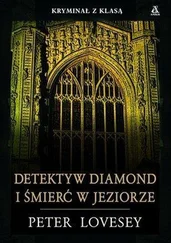Peter Lovesey - Waxwork
Здесь есть возможность читать онлайн «Peter Lovesey - Waxwork» весь текст электронной книги совершенно бесплатно (целиком полную версию без сокращений). В некоторых случаях можно слушать аудио, скачать через торрент в формате fb2 и присутствует краткое содержание. Жанр: Исторический детектив, на английском языке. Описание произведения, (предисловие) а так же отзывы посетителей доступны на портале библиотеки ЛибКат.
- Название:Waxwork
- Автор:
- Жанр:
- Год:неизвестен
- ISBN:нет данных
- Рейтинг книги:3 / 5. Голосов: 1
-
Избранное:Добавить в избранное
- Отзывы:
-
Ваша оценка:
- 60
- 1
- 2
- 3
- 4
- 5
Waxwork: краткое содержание, описание и аннотация
Предлагаем к чтению аннотацию, описание, краткое содержание или предисловие (зависит от того, что написал сам автор книги «Waxwork»). Если вы не нашли необходимую информацию о книге — напишите в комментариях, мы постараемся отыскать её.
Waxwork — читать онлайн бесплатно полную книгу (весь текст) целиком
Ниже представлен текст книги, разбитый по страницам. Система сохранения места последней прочитанной страницы, позволяет с удобством читать онлайн бесплатно книгу «Waxwork», без необходимости каждый раз заново искать на чём Вы остановились. Поставьте закладку, и сможете в любой момент перейти на страницу, на которой закончили чтение.
Интервал:
Закладка:
Unless there was a reprieve … A recommendation to the Queen from the Home Secretary. Something he had once heard passed through his mind, a story that Her Majesty was merciless towards miscreants of her own sex, reluctant ever to sign a reprieve. When a woman had confessed to murder, pleaded guilty and been sentenced to death, it would require more than an element of doubt to save her from the gallows. The abiding principle of British justice no longer applied in this case. Miriam Cromer was guilty unless she was proved innocent.
In reality, Cribb had three days left. If there were grounds for a reprieve, the Home Secretary would need to know before the weekend. He would need to weigh the evidence, make consultations, reach a decision and possibly make a recommendation to the Queen.
Three days.
Darkness was closing in as he took the footway over Hungerford Bridge. The Thames, blood-red and streaked with shadows, moved soundlessly below. The boards vibrated to the rhythms of a train steaming towards Charing Cross. Billowing vapour engulfed him.
Before it cleared, he had decided how he would spend Wednesday morning.
He would begin by winning the confidence of Inspector Moser. He would make it clear that he was not asking to see the Yard’s collection of confiscated prints and photographs out of prurience. Nor was he ambitious to oust Moser as the scourge of Holywell Street. He was interested only in securing evidence of blackmail.
WEDNESDAY, 20th JUNE
Inspector Moser was not easily convinced. He believed he had a responsibility to safeguard fellow officers from corruption. The pictures he confiscated were not kept in his office at the Yard. He locked them in despatch-boxes and delivered them in person to a store in the vaults of the Home Office. It was constantly manned by a store-keeper of unrelenting vigilance and failing eyesight. Moser escorted Cribb there and introduced him. This was at ten. It had taken three-quarters of an hour to win the concession.
Cribb was not shocked by the photographs the storekeeper brought out in the locked boxes. As he had patiently explained to Moser, twenty years in the force had removed any ignorance he had in the realm of sexual behaviour. Rather he found that the sheer mass of material oppressed him. Concentration was difficult as he worked steadily through everything retrieved from Holywell Street in the last twelve months. In front of him he placed the picture of Miriam Cromer. Each time he glanced at it to check whether there was the least resemblance to something from Moser’s collection, he saw only her reproach.
After two and a half hours he had completed the chore. His head ached, his mouth and hands were dry with dust and he had found nothing.
He was ready to bet that the first part of that confession was a fabrication. But he had no proof. His findings were all negative. Howard Cromer had not been in Brighton on the morning of the murder. Brodski had not traced the source of the photographic plates. There was not one picture of Miriam Cromer in all Inspector Moser’s haul from Holywell Street. Nothing conclusive.
From the Home Office he went directly to the public baths in Great Smith Street and took a shower. He followed it with the usual pint and pie at the Prince of Wales in Tothill Street and by 1.15 p.m. he was boarding a yellow bus in Victoria Street. It took him to Highgate.
There was nobody he knew in the police station. The sergeant on duty was busy with a complaint about damage to property, so after a word with a constable barely old enough to shave, Cribb picked up the local gazetteer and leafed through it. Among the clubs and societies he found no reference to the Highgate Literary and Artistic Society. Another negative.
He asked the constable if he had any knowledge of such an organisation. He had not. But across the room, the sergeant had caught the end of Cribb’s question. ‘Hold on, will you? I can tell you a bit about that lot when I’ve dealt with this.’
Cribb waited twenty minutes, powerless to point out that in Newgate the minutes of a woman’s life were numbered. The breaking of a few windows in Southwood Lane took precedence here.
‘There was a society of that name,’ he learned at last. ‘They stopped meeting two or three years ago over some disagreement among the members. A group of them formed another society, but it didn’t last more than a month or two. It wouldn’t, without Mrs Davenant. She ran the original society single-handed-hired the speakers, booked the rooms, collected the subscriptions, paid the bills. They didn’t need a committee.’
‘Is this lady still alive?’
‘Good Lord, yes, and don’t we know it! She runs the Watch Committee now.’
‘Single-handed?’
‘You would think so.’
‘Where can I find Mrs Davenant?’
‘What day is it? Wednesday. Try the Board School two hundred yards up the road. She likes to visit the schools once a month to see the state of the children’s heads. Public hygiene is another of her interests.’
So it was that Cribb presently found himself conducting a conversation with the enterprising Mrs Davenant across a succession of small cropped heads. Her own was sensibly covered for the exercise in something like a beekeeper’s bonnet, but enough of her face was visible through the muslin for Cribb to see that it was extensively lined, and every line contributed to an expression of iron determination.
‘This is about the woman in Kew, is it not?’ she said as soon as Cribb mentioned the Literary and Artistic Society. ‘That creature who poisoned a man. It was all in The Times. Lies!’
‘Lies, ma’am?’
‘That vile confession. A concoction of wicked lies. Mentioning my society in such a connection! I can tell you that I saw my solicitor as soon as I read the report. I wanted to sue, naturally, but he informs me that there is no possibility of legal redress. I am prevented from defending my own reputation. You would think from The Times that the Society existed for no other purpose than the debauching of innocent girls. Next.’
Another head arrived for inspection.
‘Do you recollect Mrs Miriam Cromer as a member of the Society, ma’am?’
‘I do not.’
‘It was six years ago, of course,’ said Cribb. ‘She was just a girl of twenty then, known by her maiden name of Kilpatrick. I have a photograph of her which may assist your memory.’
‘My memory requires no assistance,’ said Mrs Davenant, pushing the child away and beckoning the next. ‘And photographs, in my experience, distort the countenance beyond recognition.’
‘She referred in her confession to two friends,’ Cribb persisted. ‘Perhaps you would remember three girls of about the same age coming to the meetings?’
Mrs Davenant denied it. She denied everything but the Society’s existence. If he was to make any headway at all, Cribb had to start with that.
‘When was the Society formed?’
‘In April, 1881, the month poor Disraeli passed on. There was a prime minister! A lady would not be prevented from defending herself against libellous attacks in dear Dizzie’s day, I assure you. Not only was he a gentleman and a statesman second to none, but a literary man. For our inaugural meeting we had a Disraeli evening, as a mark of respect, with readings from Coningsby and Sybil. Next.’
‘I expect you had a good attendance for that.’
‘Thirty or forty, certainly,’ said Mrs Davenant. ‘The total membership was over eighty by the end of the year, although not all were regular attenders.’
‘This must be a very cultured part of the capital,’ Cribb commented. ‘There’s nothing like that in Bermondsey, where I live. You wouldn’t get half a dozen to a meeting.’
Читать дальшеИнтервал:
Закладка:
Похожие книги на «Waxwork»
Представляем Вашему вниманию похожие книги на «Waxwork» списком для выбора. Мы отобрали схожую по названию и смыслу литературу в надежде предоставить читателям больше вариантов отыскать новые, интересные, ещё непрочитанные произведения.
Обсуждение, отзывы о книге «Waxwork» и просто собственные мнения читателей. Оставьте ваши комментарии, напишите, что Вы думаете о произведении, его смысле или главных героях. Укажите что конкретно понравилось, а что нет, и почему Вы так считаете.
